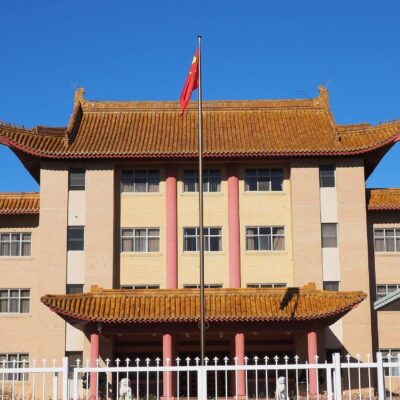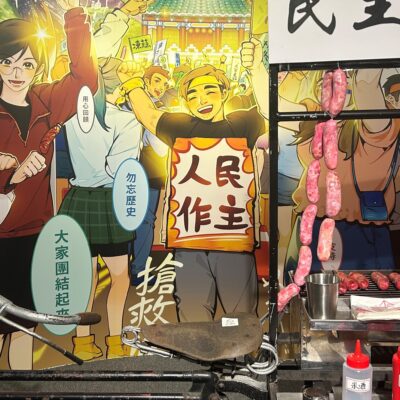Since the turn of the millennium, so-called ‘study abroad fever’ has seen millions of Chinese young people head overseas to study in Western nations. Chinese government statistics reveal that over 4.5 million studied abroad between 1978 and 2016, with an annual average growth rate of 19 percent and over half a million students departing every year since 2015. By 2019, the annual figure topped seven million.
Following the major disruption of the COVID-19 years, current enrolments in western study destinations including Australia show that Chinese students are keen to return post-pandemic.
A little-discussed aspect of China’s ongoing study-abroad fever is that a majority of Chinese students in the main western host countries are women. How, then, does gender impact these students’ experiences of overseas study? And how does studying abroad impact on how they develop and negotiate their adult sex-gender identities?
Between 2015 and 2020, I researched a core group of 50 Chinese women (assigned female at birth) studying at eight Australian universities and interviewed each of them regularly to gain an in-depth sense of how their experiences unfolded over time. I followed them from pre-departure in China, through several years of study in Australia, and on into their lives in China, Australia and the wider world after graduation. My book, Dreams of Flight: The lives of Chinese women students in the west considers the multiple and complex ways that their gendered situation shaped both their motivations for studying overseas and their day-to-day experiences in Australia. It also explores how their experience of studying abroad impacted their sense of their gendered roles and identities after graduation–a topic I am continuing to investigate in a follow-up study that draws on fresh interviews with the same group several years after graduation.
Gendered life-course norms
Understanding how time spent studying overseas impacts young Chinese women’s sex-gender experiences, identifications, and life plans requires us first to understand the context of shifting gendered life-course norms in China.
On one hand, the current generation of young, middle-class, urban women who study abroad is affected by the standard, heteronormative life-stage blueprint of the elder generations. This life course is more compressed for women than for men. It also leaves them little room for deviation between stages, mandates fixed chronological markers of proper states for each phase (for example, at what ages to focus on study, find a boyfriend, marry, have one’s first child, and so on), makes non-marital sexual activity potentially risky, and directs them toward a family-focused identity by age 30.
On the other hand, however, these well-resourced young women are simultaneously drawn toward a more open understanding of life course, which incorporates a greater diversity of possible life pathways and an extended transition to adulthood that may include non-marital (and non-heterosexual) sexual relationships. This article explores how time spent studying and living abroad affected participants’ negotiation of these contradictory models. It focuses in particular on how education mobility opens up queer possibilities, enabling them to elaborate sex- and/ or gender-non-normative forms of identification, desire, and relationships.
Key to understanding how this works is a concept I have called overseas study’s ‘zone of suspension’:
Time abroad seemed to create a ‘zone of suspension’ – a ‘“time out” from the life course’– in the sense that the full force of Chinese sex-gender norms vis-à-vis life course and relationships was somewhat suspended as a result of geographic distance. Time in Melbourne enabled these participants to work on a sense of themselves as self-animating subjects embracing a fluid life script […] including exploration of non-marital intimate relationships. Renegotiation of the normative life course in one’s country of origin may […] be a general feature of most temporary or permanent migrant experience, particularly for younger migrants. My argument […], though, is that for these mobile students, this is so in particular ways due to the rigidity and specific characteristics of the dominant feminine life course model among China’s urban middle classes.
Queer possibility
How exactly, then, does moving away from home for study harbour queer potentials for young Chinese women? Researchers have established a clear link between personal geographic mobility and people’s capacity to create queer lives and identities. This has been shown in the case of young people in China, for whom mobility between cities makes queer life-making a more accessible option for well-educated urbanites than for those ‘stuck’ by economic or family circumstance in small towns and rural areas. Similarly, for rural migrant workers there is a connection between living far from home and working-class women’s ability to establish queer lives. Others have noted a related logic with regard to gay Chinese students abroad, and going abroad can even be seen as a standard life goal in the culture of some middle-class lesbian scenes in China––although homophobia in Chinese international student communities may nonetheless reproduce hometown social pressures. Researcher Hao Zheng’s recent work fascinatingly illustrates how the mobility restrictions imposed by the COVID-19 pandemic paradoxically helped Chinese queer women students in Australia, by enforcing distance between them and their parents and enabling them to manage information sharing about their non-straight sexualities more strategically.
In my own research, two participant stories stand out in this regard. One is Yiruo’s (pseudonym). I first met Yiruo when they were just 17, before they departed for their Australian studies. I met them in their home city, together with both of their parents, and it was clear from the conversation that unfolded over the course of the evening that Yiruo’s tomboyish style and refusal to find a boyfriend were even then a source of tension between parents and child. As I got to know Yiruo better over the years that followed, it became clear that educational mobility, first to Kuala Lumpur where they attended high-school and later to Melbourne, meant time away from parental surveillance where they could more readily develop and express their genderqueer subjectivity.
About three years after our first meeting, Yiruo spoke directly and openly for the first time (though they had hinted at it before) about their same-sex attraction and how it impacted on their relationship with their parents. Yiruo said that when they revealed their same-sex preference to their parents, after a series of difficult discussions in which their parents refused to accept their homosexuality, their father finally said that if this was really how they felt, then it would be much better for them to stay in Australia after graduation, since life would be more difficult for them back in China. This became Yiruo’s goal, and they switched their postgraduate major to train in a profession included on the Australian government’s Strategic Skills List to facilitate their transition to a skilled migrant visa. ‘The most important thing for me in all this is freedom. All I want is the freedom to be how I want to be, and to be who I am,’ they said.
Today, some five years after that conversation, Yiruo remains in Melbourne studying toward a doctoral degree. They revealed to me that they are undertaking Gender Affirmation Therapy, as they have realised that they are trans rather than lesbian. When they first came out to me, I had lent them a stack of queer books from Hong Kong and Taiwan. They dutifully read these, but told me that it gradually became clear to them that they did not identify with the stories there, after all.
In our most recent interview, Yiruo told me they had recently returned from their first visit home post-COVID-19. I asked how it went, and they said it was fine, since their parents were usually not home and they had their own room, which allowed them privacy. Their parents supported them undertaking Gender Affirmation Therapy, Yiruo said, in the hope it would medically prove they were not ‘really’ trans.
These poignant, understated details hinting at ongoing family tensions underline the importance of Yiruo’s geographic separation from their parents in allowing them to pursue the kind of gender identity and life that is true to them.
*
Twenty-two year-old Jun (pseudonym) was a free spirit: full of curiosity, humour and meditative reflection. At our first meeting in Melbourne, she told me about her parents’ liberal approach to childrearing, her hopes to delay marriage for as long as possible, and her view of herself as a bit boyish or ‘gallant’ (豪爽); maybe, she thought, because her father had treated her somewhat like a son. Jun’s wardrobe spoke the global language of urban cool: Doc Martens, jeans, an Adidas jacket, a unisex black T-shirt.
One afternoon about nine months after we first met, I asked Jun if she had any romantic stories to share. She gazed at me across our lunch table for a long moment, with an ambivalent, evaluating smile, and said:
Actually, there’s something I’ve been hesitating whether to tell you… It’s that I’m not really certain of my sexual orientation. When boys signal that they’re interested in me, I just want to put distance between us. I’ve never felt anything strong for them. With my close girlfriends, I do feel something. But I’m not sure what it is…
Over the next couple of hours, Jun reflected on her uncertainties and her reluctance to speak with her parents about her sexuality and cause them unnecessary worry, since she wasn’t sure what she was feeling. She said that what she was telling me was explosive information in the Chinese student community, and that so far, I was the only one she’d told. That day, Jun felt that even if she did one day become surer of her same-sex desires, she would rather bear the burden of keeping them secret her whole life than put her parents through the pain of finding out they had a queer daughter.
Jun’s life plans, meanwhile, continued to focus on geographic mobility. On a trip back to China the following Chinese New Year, she asked her parents to allow her two years after graduation to ‘float’ (漂):
You know, float north, float south, work a bit here and there away from home. […] Just [ask my parents to] leave me alone, don’t push me to get married. […] Don’t keep pushing me to settle down, like to go home and take the civil service exam, or work in some local organization back at home. I think I should take the chance to travel round and look at things, try things out first.
Two and a half years after arriving in Melbourne, on the eve of going back to China to look for work, Jun told me that she was now surer of her same-sex attraction. She linked her new understanding of her sexuality with her geographic and social location, mentioning the recently passed marriage equality law, and a lesbian classmate who was planning to bring her girlfriend over from China to marry. In Melbourne, Jun felt she was surrounded by a sea of both visible and invisible and queer allies: ‘I might have lots of friends like this around me; some haven’t told me, and others are public about it. Actually, there are lots of this type of people around.’ I asked her to expand on how she felt living in Australia might have affected her negotiations with her sexuality, and Jun explained:
After coming overseas, my thinking on this has definitely become more liberal [开放]. Over here––well, that law wasn’t passed before [now], but everyone’s acceptance is pretty high. […] Over here, I’ve met many more friends and classmates: if I hadn’t come to Australia, I wouldn’t have met that girl, and I wouldn’t have met those [queer] classmates, those friends, and I wouldn’t have met you either, right? So I feel like it’s an amazing kind of fate [缘分]. Actually, coming to Melbourne has had a completely different impact on the development of my personal thinking than if I’d stayed in China. I think if I’d stayed in China I might have just stayed repressed. Whereas over here I’ve been more able to mold my character in that direction––more liberal, more relaxed, more calm––because the atmosphere is great here. My thinking doesn’t continually get suppressed; it’s given me the chance to express my nature a bit more, right? […] If I were in China, I think it might be very hard, that little seed might have just gotten squashed right away [laughs]. […] I’ve always been someone who loves freedom, but after coming here, I love it even more, and understand its value even more clearly. […] I want to live my life in my own way. […] Freedom of choice […], freedom of behavior, freedom of thought––all kinds of freedom––I love freedom with a reckless abandon! [laughs]
The last time I saw Jun, she was renting a room by herself in the suburbs of Shanghai, eking out a precarious living in a series of entry-level creative jobs. Despite all she felt she had gained from her years in Australia, she’d ultimately not felt a strong enough pull to stay, lacking strong local relationships or good job prospects. She was still not completely certain about her sexual orientation–but she had met another girl she liked, and thought it might be mutual.
Ultimately, Jun decided to go back to China while Yiruo stayed in Australia. But both of their stories demonstrate how education-related mobility can foster queer possibility.
The emotional cost of cross-cultural queerness
However, I argue that we should challenge the Eurocentric idea that such students simply escape ‘Chinese oppression’ to find sex-gender ‘freedom’ in the west. Within diasporic communities in Australia, Chinese sex-gender norms may still prevail and render the experience of queer Chinese-Australian youth anything but free and easy. Equally, queer scenes in western nations like Australia are often rife with racist exclusion. Rather than simply finding freedom in Australia, then, these students must endlessly mediate between different systems of value, personally absorbing the stresses created by the contradictions between them.
Yiruo’s and Jun’s stories show how for same-sex attracted, trans and questioning Chinese students, pursuing queer possibility may bring the all but unbearable prospect of disappointing one’s parents and causing them grief. Given the gendered weighting of filial care work, which today falls conventionally more heavily on daughters, who are presumed to be emotionally closer to their parents than sons, this affective cost may be said to be a gendered one, at least in part. And coming out as queer or trans may not be a simple one-time event, but a seemingly endless process that could last a lifetime and cause ongoing stress and unhappiness.
Evidently, young Chinese sex-gender minority students are eager to create alternatives to the neo-traditional ideals of feminine respectability and gendered life course that dominate in China today. Education mobility may seem for some such students to offer an alluring escape route. But things are rarely that simple, and living out cross-cultural queerness comes at a high emotional price. The extent to which the subjective changes wrought by time abroad are sustained in the longer term for those graduates who return to China remains to be seen: this is the subject of the follow-up study currently in progress.
‘Dreams of Flight. The Lives of Chinese Women Students in the West’, by Fran Martin.
Main image: Chinese students in Melbourne, September 2015. Credit: C. Zheng.




